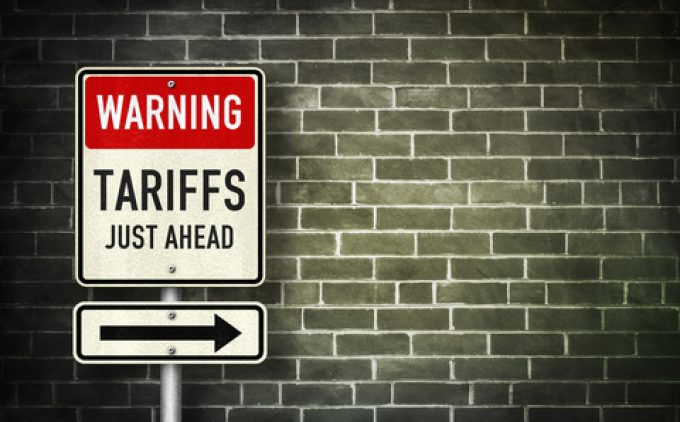Trump tariffs 2.0 – be careful what you wish for
Don’t hold your breath
ZIM: EXIT STAGE LEFTDSV: ZERO US TARIFFS IMPACT XPO: LOOKING GOODAMZN: PARTNERSHIP EXTENDEDWMT: ON A ROLLDSV: SLOW START AAPL: LEGALUPS: MULTI-MILLION PENALTY FOR UNFAIR EARNINGS DISCLOSUREWTC: PUNISHEDVW: UNDER PRESSUREKNIN: APAC LEADERSHIP WATCHZIM: TAKING PROFITPEP: MINOR HOLDINGS CONSOLIDATION
ZIM: EXIT STAGE LEFTDSV: ZERO US TARIFFS IMPACT XPO: LOOKING GOODAMZN: PARTNERSHIP EXTENDEDWMT: ON A ROLLDSV: SLOW START AAPL: LEGALUPS: MULTI-MILLION PENALTY FOR UNFAIR EARNINGS DISCLOSUREWTC: PUNISHEDVW: UNDER PRESSUREKNIN: APAC LEADERSHIP WATCHZIM: TAKING PROFITPEP: MINOR HOLDINGS CONSOLIDATION

News that US president-elect Donald Trump has mandated 25% tariffs on all products from Mexico and Canada and an extra 10% on Chinese products has sent the supply chain into a spin.
Mr Trump’s post on Truth Social last night claimed the tariffs would stop the huge imports of illegal drug fentanyl.
Claiming that China had done nothing to stop the trade, he wrote: “Until such time as they stop, we will be charging China an additional 10% tariff, above any additional tariffs, on all of their many products coming into the United States of America.”
He noted that drugs were “pouring into our country, mostly through Mexico, at levels never seen before”.
And in another post, he wrote: “On January 20th, as one of my many first executive orders, I will sign all necessary documents to charge Mexico and Canada a 25% tariff on ALL products coming into the United States, and its ridiculous open borders. This tariff will remain in effect until such time as drugs, in particular fentanyl, and all illegal aliens stop this invasion of our country!
“Both Mexico and Canada have the absolute right and power to easily solve this long-simmering problem. We hereby demand that they use this power, and until such time that they do, it is time for them to pay a very big price!”
The ‘big price’ however, will be paid by US consumers, particularly in automotive. According to 2023 data on imports from Canada and Mexico, there were $109.2bn-worth of automobile and light-duty motor vehicle manufacturing imports. In fact, six of the top 20 imports are automotive-related.
Jason Miller, professor of supply chain management at Michigan State University, noted: “The motor vehicle sector is disproportionately affected, with over $200bn in imports affected.
“Those imports will now cost importers $250bn. As dealer margins have fallen back to pre-Covid levels, this means that dealers won’t be in a position to absorb higher costs. Consequently, this will cause inflation in motor vehicle prices, and potentially drive down sales as a result.”
(For more of a deep dive on this and the financial outlook, check out today’s comment on Loadstar Premium)
Whether the tariffs are actually introduced on 20 January remains to be seen, however US ocean freight shippers looking to front-load imports before then are facing an improbably short timeframe – with a two-week transit time from China to a US west coast port, goods would need to be loaded in China during the first week in January at the latest, just six weeks from now.
The news is, however, expected to hold up freight rates on the transpacific, which have been on a gentle slide from the past month, and will give shipping lines increased hope that a proposed series of 1 December general rate increases (GRIs) on the eastbound transpacific leg – ranging from $1,000 per 40ft advertised by ONE, to $3,000 slated by Cosco, Evergreen, Hapag-Lloyd and HMM – will hold.
Meanwhile, although around 75,000 people are killed by fentanyl in the US each year, Brandon Fried, head of the US Airforwarders’ Association, is uncertain that tariffs will have any effect on the drug’s import levels.
“There’s no way they can check every single shipment. Some people say it comes in through de minimis shipments, but we push back on that. Maybe it did at one point, but we think it’s really coming in through drug mules and in trucks and things like that over the [Mexico-US land] border.”
The association has been working with the Senate Commerce Committee, which introduced a bill calling for inspections of vehicles across all modes, including trucks, aircraft and trains.
“Our position is we don’t care about you inspecting, just please don’t do it to hold up commerce in the process. Have adequate cause. We’ll see what happens,” said Mr Fried.
While many commentators have expressed surprise that Canada has been included in the first round of Trump tariffs, Mr Fried said: “Chinese goods come through Mexico at a lower duty rate, and they flow into the country. Just go and watch the trucks coming through, it’s just amazing to see the volume coming in. There’s no way they can check all that stuff.
“But I think we need to be working closely with both our border allies, not only Mexico but Canada.”
Mexico and Canada may not see themselves as allies following a tariff imposition, which would go against the spirit of the USMCA, negotiated by Mr Trump in 2020. The objectives of that agreement were to maintain a largely duty-free trade environment, and could be disputed by the neighbouring countries.
The tariffs could also lead to upset domestically, added Mr Fried: “I think if we put those tariffs in, it’s going to be harder for Mr Trump – because I’m going to be knocking on the White House door constantly to make sure he changes his mind.
“And I’m going to have company. I’m going to have the likes of the National Retail Federation and other like-minded associations there with me. There’ll be a mob outside the White House for that.
“I think Mr Trump’s job is going to get a lot harder.”
Comment on this article